
 Flash News
Flash News
9 months after taking office, the Chief of the Guard, Ermal Onuzi, resigns
He breaks arrest, steals a car and escapes like in a movie, the serial thief from Tirana is caught!
Name/ She deceived clients and took their money, the lawyer is wanted
Criminal group busted, trafficking dogs from Spain to Finland, the 'heads' of the group were Albanians
She escaped drowning in Durres, the 31-year-old English woman speaks: We capsized instantly, my friend was trapped under the vehicle

By Agron Alibali
The first pluralist elections in post-communist Albania were held on March 31, 1991. Compared to them, the elections of May 11, 2025 marked an unprecedented setback.
In 1991, the right to vote and to be elected was gradually made real. Albanian voters expressed their will freely and without hindrance.
The right to choose overturns myths
Franko Krroqi is a name that is rarely mentioned today. But in 1991, as a representative of the opposition, he defeated in Tirana Ramiz Alina himself, the First Secretary of the Party of Labor and the President of the country. And this happened right in the “safe” electoral bastion, in Ward No. 1, where the Communist Party was founded, and where Enver Hoxha himself had often run.
Ramiz Ali's defeat was, without a doubt, "shameful." But Ali, in the end, did not limit or deny voters the right to choose and be elected. He submitted to the verdict of the people, but did not include himself in the "closed lists."
The right to elect and to be elected is among the most fundamental and universal human rights. It is at the heart of a truly democratic order. Only dictators, demagogues, and delusional people hate it. It constitutes the essence of the concept of the sovereignty of the people in self-government and the management of their own affairs. In fact, in the USA this right is so consecrated that voters can decide on the spot for a new candidate, off the list [write-in candidate], without even asking what the party leader says.
This right is embodied in the current Constitution of Albania through the principle that "every citizen has the right to elect and be elected" as well as in the principle that "the vote is personal, equal, free and secret".
Furthermore, the right to vote and to be elected is universal in nature. It is also enshrined in Article 21 of the Universal Declaration of Human Rights, as well as in Article 25 of the UN Covenant on Civil and Political Rights and even in Article 3 of Protocol 1 to the European Convention on Human Rights.
But in 2025, or 34 years after 1991, Albanian voters found this right severely limited. They were faced with closed lists or “fixed-ranking candidates.” Albanian voters only decided on about 40 of the 140 future deputies. About a hundred deputies, in fact, were pre-selected by party leaders.
So how can an Assembly that emerged from elections that limited the people's undeniable right to elect and be elected be called legitimate?
Parliamentary democracy or bipolar partyocracy?
Realisht Shqipëria vetëm në letër është demokraci parlamentare. Në fakt, modeli i sotëm qeverisës mund të quhet sistem partitokratik bipolar, dhe jo një pushtet i popullit, buruar nga populli dhe që i takon atij [of the people, by the people, for the people, sikurse shprehej Abraham Lincoln].
Përfaqësuesit e popullit duhet t’i zgjedhë populli, dhe jo kryetari i partisë. Mirëpo pushteti sot në Shqipëri është i kryetarit, buron nga kryetari dhe i takon kryetarit të partisë. Për më tepër ky “cenim i mundësisë për të zgjedhur kërcënon edhe partneritetin transatlantik” midis SHBA-së dhe Evropës, e afërmendsh midis SHBA-së dhe Shqipërisë, për të perifrazuar një zyrtar të lartë të Departamentit amerikan të Shtetit.
Ndaj modeli i sotëm zgjedhor në Shqipëri s’mund të quhet as i lirë dhe as i drejtë. Ai as nuk afrohet me normat përkatëse të së drejtës ndërkombëtare të të drejtave të njeriut.
A mund të rrëzohen me referendum amendamentet e v. 2008?
Zanafilla e këtij modeli të përçudnuar makiavelik janë ndryshimet kushtetuese të vitit 2008, që eliminuan konsensusin në zgjedhjen e kreut të shtetit, dhe i hapën rrugë sistemit të sotëm pervers të partitokracisë bipolare, të republikës kryeministrore.
Të ideuara dhe të miratuara nga dy partitë kryesore PD dhe PS, ato u vijuan nga marrëveshje të tjera dypartiake, më e fundit e verës së vitit 2024, që çimentuan sistemin jo demokratik zgjedhor të proporcionalit rajonal, të kontrolluar nga krerët e partive.
Sistemi i pastër maxhoritar u zbatua në vitin 1991. Ky model siguron lidhjen më të drejtpërdrejtë e demokratike midis zgjedhësit dhe të zgjedhurit, duke anashkaluar rolin e kryetarit të partisë. Më pas u kalua në sistemin e përzier, gjithsesi të pranueshëm, ku 100 deputetë zgjidheshin sipas sistemit maxhoritar, dhe 40 sipas sistemit proporcional. Mirëpo amendamentet e v. 2008 e ndryshuan atë, duke imponuar sistemin e sotëm “proporcional rajonal”, i cili lipset të çmontohet pa vonesë.
Do të ishte hap i mirëpritur nëse vetë klasa politike të anullonte Amendamentet Kushtetuese të vitit 2008 dhe të shqyrtonte rivënien në zbatim të sistemit zgjedhor tërësisht maxhoritar, si më 1991 në Shqipëri, apo sot në SHBA, Angli e gjetkë.
Por në mungesë të një mea culpa të PS-së apo PD-së, si dhe të vështirësisë për nismë qytetare nga poshtë, si mund të zhbëhej masakra kushtetuese e v. 2008 dhe vendi të kthehej në një demokraci “të, prej dhe për popullin”?
Dihet se Kushtetuta e v. 1998 u miratua nga Kuvendi dhe u sanksionua me referendum. Mirëpo amendamentet e v. 2008 nuk iu nënshtruan referendumit popullor. Ndaj, në rrafsh kushtetues, por edhe moral, amendamentet nuk mund të barazohen me frymën dhe germën e Kushtetutës së v. 1998, dhe kësisoj nuk mund të fitonin efekt kushtetues tërësor pa miratimin e popullit.
This weak point can and should be exploited. One idea would be to convince 28 members of the Assembly to request, based on Article 177.5 of the Constitution, that the amendments approved in 2008 be submitted to a referendum. If the initiative were to take hold, then a nationwide campaign would have to convince voters to vote AGAINST the adoption of the amendments in the referendum.
So, the 2008 amendments could be overturned by popular referendum, restoring the spirit and letter of the 1998 Constitution.
Although seemingly difficult, the initiative is not impossible. The main obstacle is the dinosaurs of Albanian politics, who are generally allergic to popular referendums.
However, the initiative, possibly undertaken by the 4 "independent" deputies of the new parties, driven by a critical mass of grassroots civic activism, would increase the pressure on the two main parties so that, in tandem with the pressure from the relevant international organizations, they could achieve the final overthrow of the "pivot of all evils" in the country's constitutionality, returning it to the tracks of a true parliamentary republic, where power is truly of, by and for the people.
Taken from Landscapes of the Word
Latest news




Baçi: Rama was afraid of popular discontent, stole more votes than he thought
2025-06-03 22:10:14


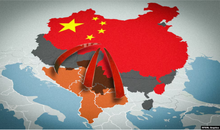

9 months after taking office, the Chief of the Guard, Ermal Onuzi, resigns
2025-06-03 20:14:09

15-year-old injured by gunfire at 'Ali Demi' pizzeria, police arrest perpetrator
2025-06-03 19:32:04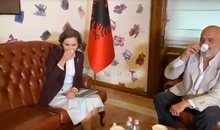

Why don't I want to spend a single day in Vlora?!
2025-06-03 18:26:21
Tech-stinction alert: Will humanity shrink to just 100 million people?
2025-06-03 18:02:23
EPP accepts Berisha's request: A fact-finding mission will be sent to Albania
2025-06-03 17:49:47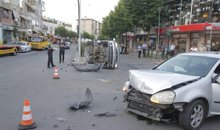
Three vehicles collide in Elbasan, several injured suspected
2025-06-03 17:45:02
Prosecutor Marsida Frashëri faces a request for dismissal at the KPA
2025-06-03 17:21:57
Nga Holanda në Finlandë, si operonte rrjeti shqiptar i drogës
2025-06-03 17:10:34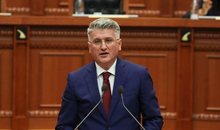

Tusk kërkon votëbesim në parlamentin polak më 11 qershor
2025-06-03 16:59:01

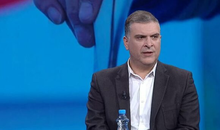
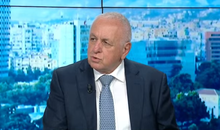



EUROPOL: Minors increasingly targeted by terrorist propaganda
2025-06-03 15:04:56
Kindergarten in Gramsh reopens where children were poisoned with salmonella
2025-06-03 14:59:16

OECD: Global economy heading for weakest growth since Covid-19
2025-06-03 14:35:26
A farm in Postribë, Shkodra, is quarantined, small livestock infected,
2025-06-03 14:21:50
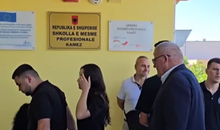
74-year-old from Kamza, the oldest high school graduate in the English exam
2025-06-03 13:59:30
The average salary in Kosovo reached 639 euros in 2024
2025-06-03 13:49:00
Osmani invites parties to consult on the date of local elections
2025-06-03 13:41:33
Name/ She deceived clients and took their money, the lawyer is wanted
2025-06-03 13:25:24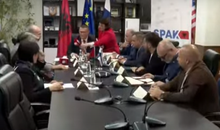

He hit and killed a 59-year-old man and fled, the young man is wanted
2025-06-03 12:58:29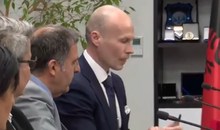
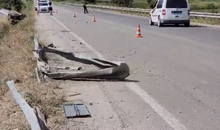
Two cars collide in Bulqiza, drivers injured
2025-06-03 12:34:46
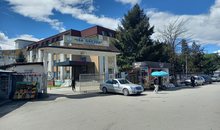

15 people arrested for cyber fraud and misuse of bank cards in Gjilan
2025-06-03 12:02:41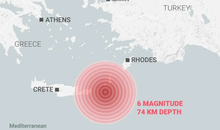
Greece and Turkey hit by earthquake
2025-06-03 11:49:08
Due to lack of lawyers/ The hearing for the 'Golden Bullet' is postponed again
2025-06-03 11:36:52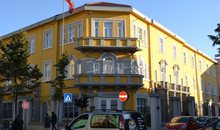

More than half of foreigners in Serbia are Russians
2025-06-03 11:15:59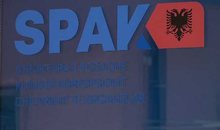
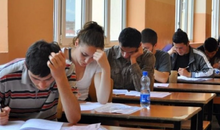
Scandal repeats, English exam thesis leaked
2025-06-03 10:46:54


They printed fake logos of well-known brands, 4 arrested, two others wanted
2025-06-03 09:42:58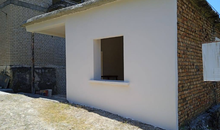
A verbal agreement by Rama prompted the contested interventions in Spaç
2025-06-03 09:23:32


Horoscope, what do the stars have in store for you today?
2025-06-03 08:34:30

Temperatures up to 31 degrees Celsius, weather forecast for this Tuesday
2025-06-03 08:09:06
Morning Post/ In 2 lines: What mattered yesterday in Albania
2025-06-03 07:51:10



Convinced DP candidate: Tirana district is opening, MPs' order changes
2025-06-02 21:42:53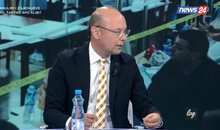


Cara: At the head of the state is a party that was not voted for by Albanians
2025-06-02 21:16:53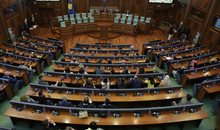
The constitution of the Kosovo Assembly fails for the 25th time
2025-06-02 21:10:46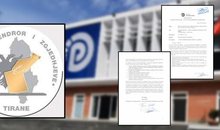
"130 thousand unused ballots", CEC responds to the DP
2025-06-02 20:51:02
Italian professor who insulted Giorgia Meloni's daughter attempts suicide
2025-06-02 20:25:21
Fire breaks out in a building in Astir
2025-06-02 20:22:46
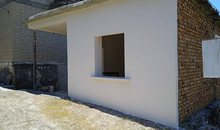



Two women threaten the Saranda prosecutor in her office
2025-06-02 19:09:20
Etna wakes up again, the most active volcano in Europe erupts
2025-06-02 19:00:36



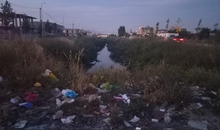
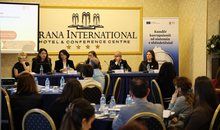


Fire reactivates in Darëzeza forest, firefighting efforts impossible
2025-06-02 17:28:29

Cultivating cannabis on a plot, 35-year-old arrested in Mirdita
2025-06-02 16:59:27

Switzerland/ Albanian caught with drugs worth over 1 million euros
2025-06-02 16:50:38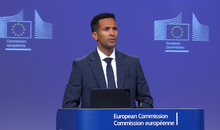
Kosovo-Serbia dialogue meetings resume in Brussels
2025-06-02 16:32:44
The VPN Era in Albania: How the TikTok Ban is "Failing", Video Views Increase
2025-06-02 16:26:36
Mahmut Orhan brings a unique experience with Curious X
2025-06-02 16:19:55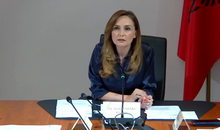

Businesses "forgot" to pay for elections, liabilities reached 4.7 billion lek
2025-06-02 15:50:27
Photo/ Caught with cocaine, Albanian arrested in Britain
2025-06-02 15:31:12


He violently opposed police officers, 39-year-old arrested in Vlora
2025-06-02 15:04:28


